Adolf Hitler: 1932-1935
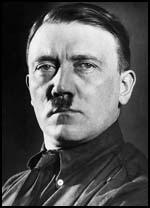
By 1932 Eva Braun was Hitler's main girlfriend. Heinrich Hoffmann, Hitler's official photographer, argued in his book, Hitler was My Friend (1955) that he was not even sure Hitler had a sexual relationship with Braun: "Eva moved into his house, became the constant companion of his leisure hours and, to the best of my knowledge, that was all there was to it... Not at any time was there any perceptible change in his attitude towards her which might have pointed to the assumption of more intimate relations between them." Eva was extremely jealous of Hitler's other girlfriends and in 1932 she also attempted suicide by shooting herself in the neck. Doctors managed to save her life, and after this incident Hitler seemed to become more attached to Eva and saw less of other women.
Anni Winter, Hitler's housekeeper, remembers that Eva Braun was often at Hitler's flat: "Eva Braun was there often when Hitler was in Munich. She was always running after him, insisting on being alone with him. She was a most demanding woman." Cate Haste, the author of Nazi Women (2001) has argued: "From the start, their relationship was conducted in secrecy, not least because Hitler did not want to be associated in public with any one woman. Eva lived at home, and her parents were strict. Hitler, almost totally preoccupied with politics, was rarely in Munich. Eva was kept firmly in the background of his life. The pattern of secrecy that began their relationship suited Hitler, and continued to its end. And so did the pattern of despair. In November 1932, Eva Braun attempted suicide by shooting herself with her father's pistol, but she then rang Hitler's doctor, who came in time to save her, and the whole thing was hushed up. Hitler came to visit her with flowers at the clinic where she was recovering. Eva, the shadowy, loyal figure at the periphery of Hitler's life, continued to be frustrated by his neglect. Hitler would turn up at unpredictable times, and his moods shifted between gushing charm and indifference."
The Nazi Party always attempted to keep Hitler's love life secret. In his speeches Hitler claimed that he had never married because he was "married to the German people." The severe casualties suffered during the First World War meant that there was a large number of widows and spinsters in Germany. Women in Germany found Hitler's bachelor image attractive and this helped win him votes during elections. It was for this reason that Eva Braun was never seen in public with Hitler.
William L. Shirer, the author of The Rise and Fall of the Third Reich (1960) points out: "Hitler, although he was undoubtedly extremely fond of her and found relaxation in her unobtrusive company, had always kept her out of sight, refusing to allow her to come to his various headquarters where he spent almost all of his time during the war years, and rarely permitting her even to come to Berlin. She remained immured at the Berghof on the Obersalzberg, passing her time in swimming and skiing, in reading cheap novels and seeing trashy films, in dancing (which Hitler disapproved of) and endlessly grooming herself, pining away for her absent loved one."
Adolf Hitler had no desire to have children. He told several people that if he had children they were certain to disappoint him as they would never match his own genius. The Nazi Party always attempted to keep Hitler's love life secret. In his speeches Hitler claimed that he had never married because he was "married to the German people." The severe casualties suffered during the First World War meant that there was a large number of widows and spinsters in Germany. Women in Germany found Hitler's bachelor image attractive and this helped win him votes during elections.
The historian, Alan Bullock suggests in his book, Hitler: A Study in Tyranny (1962), that Hitler was incapable of normal sexual intercourse. He quotes Ernst Hanfstaengel, a close intimate of Hitler. In his book, Hitler: The Missing Years (1957) Hanfstaengel argues: "The abounding nervous energy which found no normal release sought compensation first in the subjection of his entourage, then in his country, then of Europe... In the sexual no man's land in which he lived, he only once nearly found the woman, and never even the man, who might have brought him relief."
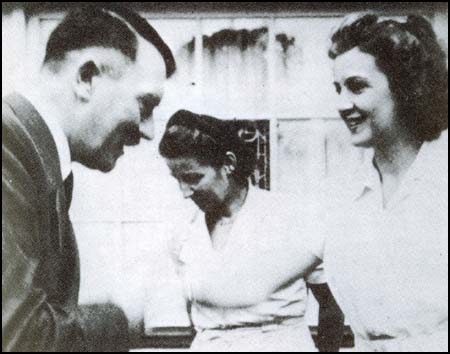
In 1932 Hitler met Renate Müller while she making a film on location near the Danish coast in the autumn of 1932. He watched the shooting all day and in the evening visited the house where she was staying. She later told the film director, Adolf Zeissler: "He sat there, not moving at all, looking at me all the time, and then he'd take my hand in his and look some more. He talked all the time - just nonsense."
Ronald Hayman, the author of Hitler and Geli (1998): "After this he arranged frequent meetings with her, and the jewellery he gave her included a diamond bracelet more valuable than any of his presents to Geli and Eva Braun. But the demands he made were as unpalatable to her as to Geli. One night, for instance, at the Chancellery, he began by going into detail about Gestapo methods of torture, comparing them with medieval techniques. After they had both taken their clothes off he lay on the floor, begging her to hit him and kick him. She refused, but he went on heaping accusations on his own head, saying he was her slave, unworthy to be in the same room. Eventually giving in, she started to kick him, abuse him with obscene words and hit him with his whip. Becoming increasingly excited, Hitler started to masturbate. After his orgasm, he suggested quietly that they should both put their clothes on. They drank a glass of wine together and chatted about trivialities. Finally he stood up, kissed her hand, thanked her for a pleasant evening and rang for a servant to show her out."
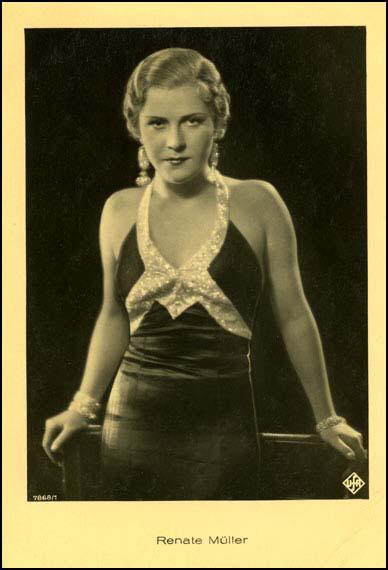
In 1932 Hitler met Albert Speer. It has been claimed by Speer's biographer, Gitta Sereny, that the two men were attracted to each other because of their psychological past: "Both were bedevilled from childhood by thwarted, imagined and withheld love, a deficiency which rendered them both virtually incapable of expressing private emotions... Both of them, capable of great charm and courted by women, could barely respond though neither of them was homosexual."
Ronald Hayman has pointed out: "The attractive, well-born, Nordic-looking Speer was a man Hitler would have liked to resemble, or, ideally, to be. Able to transpose Speer's concepts into reality, Hitler was the all-powerful father, the protector Speer had always needed or believed himself to need. Never developing the homosexual side of his nature, Hitler was aware of it and sufficiently afraid of it to hit out viciously against homosexuals and homosexuality, fulminating against it as a social evil he would eradicate as soon as he came to power. And he tried to implement this threat. In Germany there were almost 30,000 prosecutions for homosexuality between 1936 and 1939, compared with 3261 between 1931 and 1934."
According to another source: "Some of his most ridiculous behaviour was prompted by the desire to appear robustly masculine and tremendously virile. Showing his library to a young woman and seeing that her attention was wandering, he abruptly stiffened his arm in a Nazi salute." Hitler told the woman: "I can hold my arm like that for two solid hours. I never feel tired when my storm troopers and soldiers march past me and I stand at this salute. I never move. My arm is like granite, rigid and unbending. But Goering can't stand it. He has to drop his hand after half an hour at this salute. He's flabby. But I am hard.... It's an amazing feat. Sometimes I marvel at my own power.
Friedelind Wagner, the daughter of Siegfried Wagner, the German composer, saw him making a speech during this period: "I never forgot her first impression of this man in Bavarian leather breeches, short, thick woollen socks, a red-blue checked shirt and a short blue jacket that bagged about his unpadded skeleton. His sharp cheekbones stuck out over hollow, pasty cheeks, and above them was a pair of unnaturally bright-blue eyes. There was a half-starved look about him, but something else too, a sort of fanatical look."
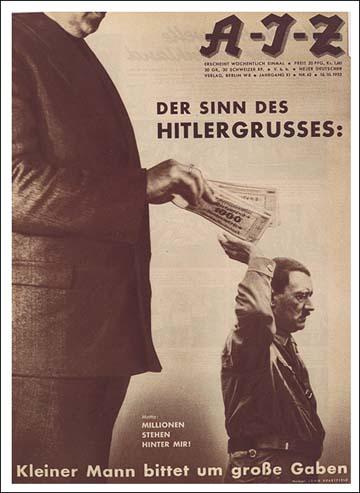
Heinrich Brüning and other senior politicians were worried that Hitler would use his stormtroopers to take power by force. Led by Ernst Roehm, it now contained over 400,000 men. Under the terms of the Treaty of Versailles the official German Army was restricted to 100,000 men and was therefore outnumbered by the SA. In the past, those who feared communism were willing to put up with the SA as they provided a useful barrier against the possibility of revolution. However, with the growth in SA violence and fearing a Nazi coup, Bruening banned the organization.
In May 1932 General Hans von Seeckt joined up with Alfred Hugenberg, Hjalmar Schacht, Graf Kalkreuth, the president of Junkers' Land League and several industrialists, to call for the uniting of the parties of the right. They demanding the resignation of Heinrich Brüning. Germany's president, Paul von Hindenburg, agreed and forced him to leave office and he was replaced as chancellor by Franz von Papen. The new chancellor was also a member of the Catholic Centre Party and, being more sympathetic to the Nazis, he removed the ban on the SA. The next few weeks saw open warfare on the streets between the Nazis and the Communists during which 86 people were killed.
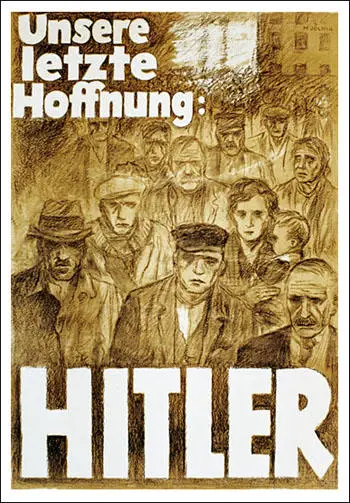
In an attempt to gain support for his new government, in July, Papen called another election. Hitler now had the support of the upper and middle classes and the NSDAP did well winning 230 seats, making it the largest party in the Reichstag. However the German Social Democrat Party (133) and the German Communist Party (89) still had the support of the urban working class and Hitler was deprived of an overall majority in parliament.
Hitler demanded that he should be made Chancellor but Paul von Hindenburg refused and instead gave the position to Major-General Kurt von Schleicher. Hitler was furious and began to abandon his strategy of disguising his extremist views. In one speech he called for the end of democracy a system which he described as being the "rule of stupidity, of mediocrity, of half-heartedness, of cowardice, of weakness, and of inadequacy."
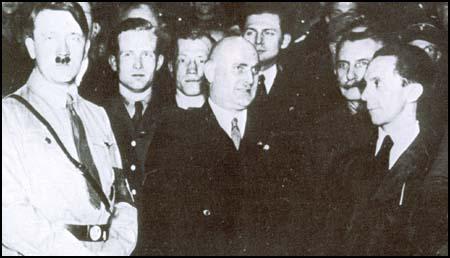
The behaviour of the NSDAP became more violent. On one occasion 167 Nazis beat up 57 members of the German Communist Party in the Reichstag. They were then physically thrown out of the building. The stormtroopers also carried out terrible acts of violence against socialists and communists. In one incident in Silesia, a young member of the KPD had his eyes poked out with a billiard cue and was then stabbed to death in front of his mother. Four members of the SA were convicted of the rime. Many people were shocked when Hitler sent a letter of support for the four men and promised to do what he could to get them released.
Incidents such as these worried many Germans, and in the elections that took place in November 1932 the support for the Nazi Party fell. The German Communist Party made substantial gains in the election winning 100 seats. Hitler used this to create a sense of panic by claiming that German was on the verge of a Bolshevik Revolution and only the NSDAP could prevent this happening.
A group of prominent industrialists who feared such a revolution sent a petition to Paul von Hindenburg asking for Hitler to become Chancellor. Hindenberg reluctantly agreed to their request and at the age of forty-three, Hitler became the new Chancellor of Germany. Although Hitler had the support of certain sections of the German population he never gained an elected majority. The best the National Socialist German Workers Party (NSDAP) could do in a election was 37.3 per cent of the vote they gained in July 1932. When Hitler became chancellor in January 1933, the Nazis only had a third of the seats in the Reichstag.
Soon after Hitler became chancellor he announced new elections. Hermann Goering called a meeting of important industrialists where he told them that the 1933 General Election could be the last in Germany for a very long time. Goering added that the NSDAP would need a considerable amount of of money to ensure victory. Those present responded by donating 3 million Reichmarks. As Joseph Goebbels wrote in his diary after the meeting: "Radio and press are at our disposal. Even money is not lacking this time."
Behind the scenes Goering, who was minister of the interior in Hitler's government, was busily sacking senior police officers and replacing them with Nazi supporters. These men were later to become known as the Gestapo. Goering also recruited 50,000 members of the Sturm Abteilung (SA) to work as police auxiliaries. Goering then raided the headquarters of the Communist Party (KPD) in Berlin and claimed that he had uncovered a plot to overthrow the government. Leaders of the KPD were arrested but no evidence was ever produced to support Goering's accusations. He also announced he had discovered a communist plot to poison German milk supplies.
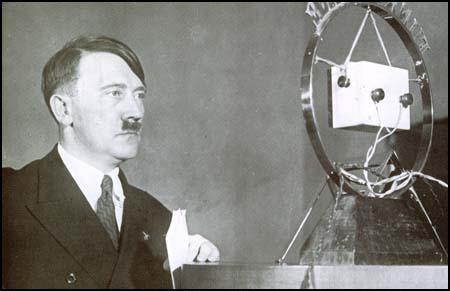
On 27th February, 1933, someone set fire to the Reichstag. Several people were arrested including a leading, Georgi Dimitrov, general secretary of the Comintern, the international communist organization. Dimitrov was eventually acquitted but a young man from the Netherlands, Marianus van der Lubbe, was eventually executed for the crime. As a teenager Lubbe had been a communist and Hermann Goering used this information to claim that the Reichstag Fire was part of a KPD plot to overthrow the government.
Hitler gave orders that all leaders of the German Communist Party should "be hanged that very night." Paul von Hindenburg vetoed this decision but did agree that Hitler should take "dictatorial powers". KPD candidates in the election were arrested and Hermann Goering announced that the Nazi Party planned "to exterminate" German communists.
Thousands of members of the Social Democrat Party and Communist Party were arrested and sent to recently opened to concentration camp. They were called this because they "concentrated" the enemy into a restricted area. Hitler named these camps after those used by the British during the Boer War.
Left-wing election meetings were broken up by the Sturm Abteilung (SA) and several candidates were murdered. Newspapers that supported these political parties were closed down during the 1933 General Election. Although it was extremely difficult for the opposition parties to campaign properly, Hitler and the Nazi party still failed to win an overall victory in the election on 5th March, 1933. The NSDAP received 43.9% of the vote and only 288 seats out of the available 647. The increase in the Nazi vote had mainly come from the Catholic rural areas who feared the possibility of an atheistic Communist government.
After the 1933 General Election Hitler proposed an Enabling Bill that would give him dictatorial powers. Such an act needed three-quarters of the members of the Reichstag to vote in its favour. All the active members of the Communist Party, were in concentration camps, in hiding, or had left the country (an estimated 60,000 people left Germany during the first few weeks after the election). This was also true of most of the leaders of the other left-wing party, Social Democrat Party (SDP). However, Hitler still needed the support of the Catholic Centre Party (BVP) to pass this legislation. Hitler therefore offered the BVP a deal: vote for the bill and the Nazi government would guarantee the rights of the Catholic Church. The BVP agreed and when the vote was taken, only 94 members of the SDP voted against the Enabling Bill.
Hitler was now dictator of Germany. His first move was to take over the trade unions. Its leaders were sent to concentration camps and the organization was put under the control of the Nazi Party. The trade union movement now became known as the Labour Front.
Soon afterwards the Communist Party and the Social Democrat Party were banned. Party activists still in the country were arrested. A month later Hitler announced that the Catholic Centre Party, the Nationalist Party and all other political parties other than the NSDAP were illegal, and by the end of 1933 over 150,000 political prisoners were in concentration camps. Hitler was aware that people have a great fear of the unknown, and if prisoners were released, they were warned that if they told anyone of their experiences they would be sent back to the camp.
It was not only left-wing politicians and trade union activists who were sent to concentration camp. The Gestapo also began arresting beggars, prostitutes, homosexuals, alcoholics and anyone who was incapable of working. Although some inmates were tortured, the only people killed during this period were prisoners who tried to escape and those classed as "incurably insane".
Hitler's Germany became known as a fascist state. Fascist was originally used to describe the government of Benito Mussolini in Italy. Mussolini's fascist one-party state emphasized patriotism, national unity, hatred of communism, admiration of military values and unquestioning obedience. Hitler was deeply influenced by Mussolini's Italy and his Germany shared many of the same characteristics.
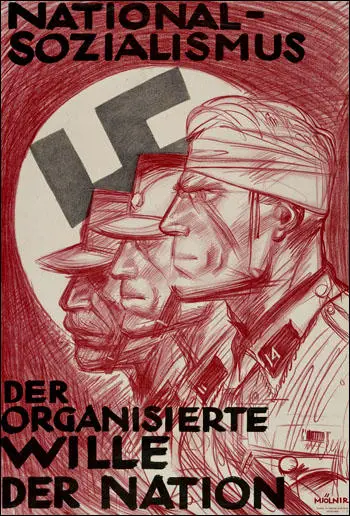
Hitler appointed Gottfried Feder as Under-Secretary at the Ministry of Economics. Feder was disappointed that he had not been given a more senior position. Konrad Heiden pointed out that Feder also had to serve under someone who completely opposed his economic policies: "The post of under-secretary was an humiliating position ... His new superior was almost a stranger to the party, but familiar to the stock exchange... he was Doctor Karl Schmitt, general director of the largest German insurance company. A more pronounced representative of rapacious capital would have been hard to find; Schmitt had spent his life lending money and collecting interest; he had literally bought his way into the National Socialist Movement by giving the party generous aid in hard times."
Feder continued to campaign for nationalization, profit-sharing, the abolition of unearned incomes and the "thraldom of interest". Hitler refused to do this. As Alan Bullock, the author of Hitler: A Study in Tyranny (1962) has pointed out: "Hitler had never been a Socialist; he was indifferent to economic questions. What he saw, however, was that radical economic experiments at such a time would throw the German economy into a state of confusion, and would prejudice, if not destroy, the chances of cooperation with industry and business to end the Depression and bring down the unemployment figures."
Hitler confirmed this in a speech he made on 6th July, 1933: "The revolution is not a permanent state of affairs, and it must not be allowed to develop into such a state. The stream of revolution released must be guided into the safe channel of evolution.... We must therefore not dismiss a business man if he is a good business man, even if he is not yet a National Socialist; and especially not if the National Socialist who is to take his place knows nothing about business. In business, ability must be the only authoritative standard.... History will not judge us according to whether we have removed and imprisoned the largest number of economists, but according to whether we have succeeded in providing work.... The ideas of the programme do not oblige us to act like fools and upset everything, but to realize our trains of thought wisely and carefully. In the long run our political power will be all the more secure, the more we succeed in underpinning it economically."
The German economic system remained capitalistic but the state played a more prominent role in managing the economy. Industrialists were sometimes told what to produce and what price they should charge for the goods that they made. The government also had the power to order workers to move to where they were required. By taking these powers Hitler's government was able to control factors such as inflation and unemployment that had caused considerable distress in previous years. As the government generally allowed companies to maintain their profit margins, industrialists tended to accept the loss of some of their freedoms.
Under fascism, most potential sources of opposition were removed. This included political parties and the trade union movement. However, Hitler never felt strong enough to take complete control of the German Army, and before taking important decisions he always had to take into consideration how the armed forces would react. The individual had no freedom to protest in Hitler's Germany. All political organizations were either banned or under the control of the Nazis. Except for the occasional referendum, all elections, local and national, were abolished. All information that people in Germany received was selected and organized to support fascist beliefs. As Minister of Propaganda, Joseph Goebbels kept a close check on the information provided by newspapers, magazines, books, radio broadcasts, plays and films.
Hitler, who had been deeply influenced by his own history teacher, Leopold Potsch, was fully aware that schools posed a potential threat to the dominant fascist ideology. Teachers who were critical of Hitler's Germany were sacked and the rest were sent away to be trained to become good fascists. Members of the Nazi youth organizations such as the Hitler Youth, were also asked to report teachers who questioned fascism. As a further precaution against young people coming into contact with information and the government disapproved of, textbooks were withdrawn and rewritten by Nazis.
Fritz Gerlich, the editor of the anti-Nazi, Der Gerade Weg, had been a strong opponent of Hitler since 1923. It has been pointed out that he was the "most outspoken centre of anti-Hitler journalism on the conservative side of the political spectrum" in Germany. Gerlich was one of those journalists who believed Hitler had murdered Geli Raubal. According to the son of a man who worked for Gerlich, the newspaper got hold of a copy of "a state's attorney inquiry into the matter of Geli Raubal" that purportedly "showed that Geli was killed by order of Hitler."
It is believed that Gerlich was working on the Raubal story when on 9th March, 1933, Max Amann and Emil Maurice led a gang of stormtroopers into his offices, smashed all the machines and destroyed the contents of desks, files, cupboards and drawers, including the copy for the next issue of the newspaper. According to Ron Rosenbaum, the author of Explaining Hitler: The Search for the Origins of his Evil (1998): "The nature of the expose he'd been about to publish - some said it concerned the circumstances of the death of Hitler's half-niece Geli Raubal in his apartment, others said it concerned the truth about the February 1933 Reichstag fire or foreign funding of the Nazis - has been effectively lost to history." Gerlich was murdered on the instructions of Hitler while being held at Dachau on 30th June, 1934. To notify his wife, they sent her his blood-spattered spectacles.
Adolf Hitler obtained a lot of support from the press baron, Lord Rothermere, who produced a series of articles in The Daily Mail acclaiming the new regime. The most famous of these was on the 10th July when he told readers that he "confidently expected" great things of the Nazi regime. He also criticised other newspapers for "its obsession with Nazi violence and racialism", and assured his readers that any such deeds would be "submerged by the immense benefits that the new regime is already bestowing on Germany." This was part of a campaign of the Nazi Party. The Daily Mail criticized "the old women of both sexes" who filled British newspapers with rabid reports of Nazi "excesses." Instead, the newspaper claimed, Hitler had saved Germany from "Israelites of international attachments" and the "minor misdeeds of individual Nazis will be submerged by the immense benefits that the new regime is already bestowing upon Germany."
On 10th July, 1933, Rothermere published another article on Nazi Germany: "These young Germans have discovered, as I am glad to note the young men and women of England are discovering, that it is no good trusting to the old politicians. Accordingly they have formed, as I should like to see our British youth form, a Parliamentary party of their own.... We can do nothing to check this Movement (the Nazis) and I believe it would be a blunder for the British people to take up an attitude of hostility towards it.... We must change our conception of Germany... The older generation of Germans were our enemies. Must we make enemies of this younger generation too? If we do, sooner or later another and more terrible awakening is in store for Europe. Let us considerwell before we lay our course toward that peril. If we examine this transfer of political influence in Germany to the National Socialists we shall find that it has many advantages for the rest of Europe. It sets up an additional rampart against Bolshevism. It eliminates the grave danger that the Soviet campaign against civilization might penetrate to Germany, thus winning an impregnable position in the strategical center of Europe."
Christa Schroeder joined his Liaison Staff in Berlin in 1933. Hitler installed himself in the Radziwill Palace. Schroeder wrote in her autobiography, He Was My Chief: The Memoirs of Adolf Hitler's Secretary (1985): "His study, the library, his bedroom and later, alongside it, Eva Braun's apartment were all on the first floor. Directly opposite the door to Hitler's study a couple of steps led to a long corridor, beyond which was the so-called adjutancy wing with the rooms for Hitler's aides. The first room was the Staircase Room (Treppenzimmer), where at least one of us would be permanently on standby, regardless of the hour, should Hitler need to give a dictation. Then came the rooms of Julius Schaub, Hitler's rather unprepossessing factotum, Dr Dietrich (Reich press officer), Sepp Dietrich (commander of SS-Leibstandarte Adolf Hitler, Hitler's personal bodyguard unit) and Hitler's chief adjutant, Wilhelm Brückner."
According to Albert Speer, the author of Inside the Third Reich (1970), during this period, Hitler's inner-circle included Joseph Goebbels, Herman Goering, Hermann Esser, Wilhelm Brückner, Julius Schreck, Sepp Diettrich, Julius Schaub, Heinrich Hoffmann, Franz Schwarz, Max Amann and Otto Dietrich: "Evenings he usually had some trusty companions about: Schreck, his chauffeur for many years; Sepp Dietrich, the commander of his SS bodyguard; Dr. Otto Dietrich, the press chief; Brückner and Schaub, his two adjutants; and Heinrich Hoffmann, his official photographer. Since the table held no more than ten persons, this group almost completely filled it. For the midday meal, on the other hand, Hitler's old Munich comrades foregathered, such as Amann, Schwarz and Esser... I saw very little of Himmler, Roehm or Streicher at these meals, but Goebbels and Goering were often there."
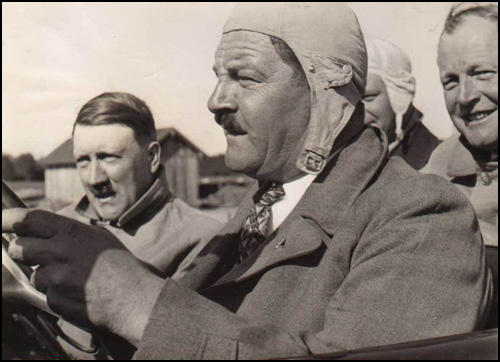
Hitler also employed his former commanding officer, Captain Fritz Wiedemann as his Personal Adjutant at the Reich Chancellery. Wiedemann later recalled that Germany's leader was a man who he once ordered to give the canteen a coat of paint while serving in the First World War. He admitted that he had been wrong about Hitler's leadership qualities: "It was certainly not the first time in world history that a man of humble and obscure origins... was driven to achieve things of which no-one would have thought him capable".
Wiedemann became an important figure in the Nazi leadership. It was claimed "Hitler had a particularly soft spot for him" and that Wiedemann was downright alarming in his youthful zeal for the Party". Martha Dodd, the daughter of William Dodd, the American ambassador in Berlin, met Wiedemann on several occasions. In her book, My Years in Germany (1975) she pointed out: "Tall, dark, muscular, he certainly had great physical brawn and the appearance of bravery... Wiedemann's heavy face, with beetling eyebrows, friendly eyes and an extremely low forehead, was rather attractive... But I got the impression of an uncultivated, primitive mind, with the shrewdness and cunning of an animal, and completely without delicacy or subtlety... Certainly Wiedemann was a dangerous man to cross, for despite his social naivety and beguiling clumsiness, he was as ruthless a fighter and schemer as some of his compatriots."
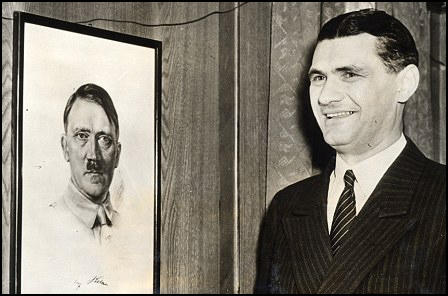
In November, 1933, Lord Rothermere gave Princess Stephanie von Hohenlohe the task of establishing personal contact with Adolf Hitler. Princess Stephanie later recalled: "Rothermere came from a family that had experienced the novel possibility of influencing international politics through newspapers and was determined to sound out Hitler." Stephanie went to Berlin and began a sexual relationship with Fritz Wiedemann, Hitler's personal adjutant. Wiedemann reported back to Hitler that Stephanie was the mistress of Lord Rothermere. Hitler decided that she could be of future use to the government and gave Wiedemann 20,000 Reichsmarks as a maintenance allowance to ensure that she had her hotel, restaurant bills, telephone bills and taxi and travel fares paid. Wiedemann was also allowed to buy her expensive clothes and gifts.
The following month Wiedemann arranged for Princess Stephanie to have her first meeting with Hitler. According to Jim Wilson, the author of Nazi Princess: Hitler, Lord Rothermere and Princess Stephanie Von Hohenlohe (2011): "The Führer appears to have been highly impressed by her sophistication, her intelligence and her charms. At that first meeting she wore one of her most elegant outfits, calculating it would impress him. It seems to have done so, because Hitler greeted her with uncharacteristic warmth, kissing her on the hand. It was far from usual for Hitler to be so attentive to women, particularly women introduced to him for the first time. The princess was invited to take tea with him, and once seated beside him, according to her unpublished memoirs. Hitler scarcely took his piercing eyes off her."
Princess Stephanie handed Hitler a personal letter from Rothermere, and passed on a verbal message. According to Stephanie on the day the outcome of the Reichstag election had been announced, Rothermere had told some of his staff: "Remember this day. Hitler is going to rule Germany. The man will make history and I predict that he will change the face of Europe." Hitler responded by kissing her and presenting her with a personally addressed reply, asking her to convey it direct to Lord Rothermere.
In the letter Adolf Hitler thanked Lord Rothermere for supporting his policies: "I should like to express the appreciation of countless Germans, who regard me as their spokesman, for the wise and beneficial support which you have given to a policy that we all hope will contribute to the final liberation of Europe. Just as we are fanatically determined to defend ourselves against attack, so do we reject the idea of taking the initiative in bringing about a war... I am convinced that no one who fought in the front line trenches during the world war, no matter in what European country, desires another conflict."
Lord Rothermere sent Princess Stephanie back with a gift for Hitler. It was a portrait photograph of Rothermere, mounted in a solid gold frame, made by Cartier of Paris and worth more than £50,000 at today's prices. On the reverse of the frame was a reprint of the page from The Daily Mail of 24th September 1930, which reproduced Rothermere's initial editorial, hailing the success of Hitler in the General Election. Hitler was delighted as Rothermere was clearly delivering the propaganda he sought.
Hitler was deeply impressed by Princess Stephanie von Hohenlohe but there were people in Hitler's immediate circle who resented the favours the Führer was showing her. This included Ernst Hanfstaengel who warned Hitler that Stephanie was a "professional blackmailer and a full-blooded Jewess". Hitler promised Hanfstaengel he would have the princess' family history researched. Hitler later told Hanfstaengel that the Gestapo had investigated her background thoroughly and had found the allegations that she was Jewish totally unfounded.
Princess Stephanie wrote in her unpublished memoirs: "He hardly ever smiles, except when making a sarcastic remark. He can be, he often is, very bitter. I think I can truthfully say that with the exception of his very intimate circle I am one of the few persons with whom he held normal conversations. By that I mean one where both parties speak in turn: a conversation of two human beings. Usually this is not the case. He either make, a speech and one has to listen, or else he sits there with a dead serious face, never opening his mouth... He once told me when I expressed my astonishment at his never learning English that the reason he would not be able to learn any other language outside of German was his complete mastery of the latter, which was an all time job. But I have never found that Hitler speaks or writes German as well as he claims or thinks. I have had many occasions to read letters of his, where all he did was revel in heavily involved Teutonic sentences. A single sentence often attains as much as eight or ten lines The same is true of all his speeches."
The Daily Telegraph later reported: "In 1933, the year that Hitler gained power, MI6 circulated a report stating that the French secret service had discovered documents in the princess's flat in Paris ordering her to persuade Rothermere to campaign for the return to Germany of territory ceded to Poland at the end of First World War. She was to receive £300,000 – equal to £13 million today if she succeeded."
On 23rd March 1934, Adolf Hitler gave Franz Schwarz full authority for the financial affairs of the party. He was also named a Reichsleiter (Reich Leader), which was the second highest political rank of the Nazi Party. Hitler commented: "I was not slow to perceive his qualities.... Schwarz organized, in a model fashion, everything that gradually became the Party's gigantic financial administration.... He had the fault - and what luck that was! - of not being a lawyer and nobody had more practical good sense than he had. He knew admirably how to economize on small things - with the result that we always had what we needed for important matters. It was Schwarz who enabled me to administer the Party without our having to rely on petty cash. In this way, unexpected assets are like manna." Joseph Goebbels was also impressed with Schwarz who he regarded as an able administrator.
In August 1934 Princess Stephanie von Hohenlohe wrote a letter to Lord Rothermere asking him to meet Hitler: "Please let me impress upon you that you ought to see H (Hitler) now. I know he already has some doubts as to your sincerity. I hope you have not forgotten that you assured him in your last letter you would see him in the latter part of August... He intends to discuss his present and future plans with you, and I think it is, for the first time, more in your interests than his, for you to see him."
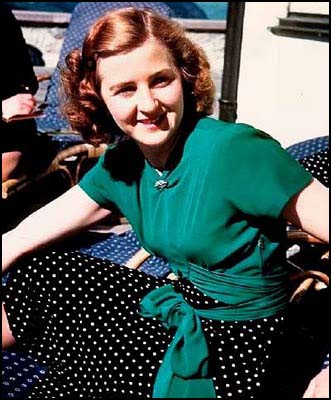
.
In July, 1934 Lord Rothermere suddenly withdrew his support for Oswald Mosley. The historian, James Pool, argues: "The rumor on Fleet Street was that the Daily Mail's Jewish advertisers had threatened to place their adds in a different paper if Rothermere continued the profascist campaign." Pool points out that sometime after this, Rothermere met with Hitler at the Berghof and told how the "Jews cut off his complete revenue from advertising" and compelled him to "toe the line." Hitler later recalled Rothermere telling him that it was "quite impossible at short notice to take any effective countermeasures."
Lord Rothermere made his first visit to Adolf Hitler in December 1934. He took along with him his favourite journalist on The Daily Mail, the veteran reporter, George Ward Price. At the first meeting Hitler told Rothermere that "Lloyd George and your brother won the war for Britain. This was a reference to the Prime Minister David Lloyd George and Lord Northcliffe, who it was claimed made sure that the British Army received enough munitions on the front-line during the later stages of the First World War. That evening Hitler held his first major dinner party he had given for foreign visitors at his official residence in Berlin since he had taken office. The high-level guests included Joseph Goebbels, Hermann Goering and Joachim von Ribbentrop.
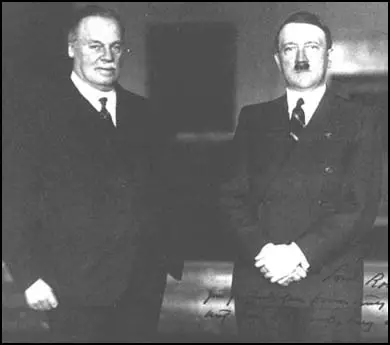
On 20th December, 1934, Lord Rothermere returned the hospitality, hosting a dinner at Berlin's famous Hotel Adlon. Princess Stephanie von Hohenlohe was placed in charge of the arrangements. Twenty-five guests attended including Adolf Hitler, Germany's Foreign Minister Konstantin von Neurath, Joseph Goebbels, Magda Goebbels, Hermann Goering, accompanied by the actress Emmy Sonnemann. Also invited was British banker Ernest Tennant, one of the principal founders of the Anglo-German Fellowship.
By 1934 Hitler appeared to have complete control over Germany, but like most dictators, he constantly feared that he might be ousted by others who wanted his power. To protect himself from a possible coup, Hitler used the tactic of divide and rule and encouraged other leaders such as Hermann Goering, Joseph Goebbels, Heinrich Himmler and Ernst Roehm to compete with each other for senior positions.
One of the consequences of this policy was that these men developed a dislike for each other. Roehm was particularly hated because as leader of the Sturm Abteilung (SA) he had tremendous power and had the potential to remove any one of his competitors. Goering and Himmler asked Reinhard Heydrich to assemble a dossier on Roehm. Heydrich, who also feared him, manufactured evidence that suggested that Roehm had been paid 12 million marks by the French to overthrow Hitler.
Hitler liked Ernst Roehm and initially refused to believe the dossier provided by Heydrich. Roehm had been one of his first supporters and, without his ability to obtain army funds in the early days of the movement, it is unlikely that the Nazis would have ever become established. The SA under Roehm's leadership had also played a vital role in destroying the opposition during the elections of 1932 and 1933.
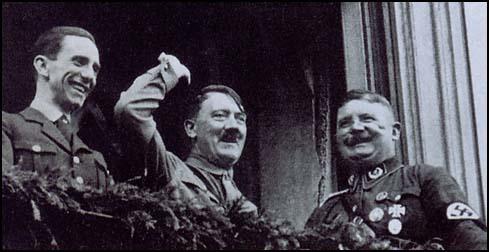
However, Hitler had his own reasons for wanting Roehm removed. Powerful supporters of Hitler had been complaining about Roehm for some time. Generals were afraid that the Sturm Abteilung (SA), a force of over 3 million men, would absorb the much smaller German Army into its ranks and Roehm would become its overall leader. Industrialists, who had provided the funds for the Nazi victory, were unhappy with Roehm's socialistic views on the economy and his claims that the real revolution had still to take place. Many people in the party also disapproved of the fact that Roehm and many other leaders of the SA were homosexuals. Louis L. Snyder argues: "Hitler later alleged that his trusted friend Roehm had entered a conspiracy to take over political power. The Führer was told, possibly by one of Roehm's jealous colleagues, that Roehm intended to use the SA to bring a socialist state into existence... On June, 1934... Hitler came to his final decision to eliminate the socialist element in the party. A list of hundreds of victims was prepared."
Hitler was also aware that Roehm and the SA had the power to remove him as leader. Hermann Goering and Heinrich Himmler played on this fear by constantly feeding him with new information on Roehm's proposed coup. Their masterstroke was to claim that Gregor Strasser, whom Hitler hated, was part of the planned conspiracy against him. With this news Hitler ordered all the SA leaders to attend a meeting in the Hanselbauer Hotel in Bad Wiesse.
Industrialists such as Albert Voegler, Gustav Krupp, Alfried Krupp, Fritz Thyssen and Emile Kirdorf, who had provided the funds for the Nazi victory, were unhappy with Roehm's socialistic views on the economy and his claims that the real revolution had still to take place. Many people in the party also disapproved of the fact that Roehm and many other leaders of the SA were homosexuals. Meanwhile Goering and Himmler were drawing up a list of people outside the SA that they wanted killed. The list included Strasser, Kurt von Schleicher, Hitler's predecessor as chancellor, and Gustav von Kahr, who crushed the Beer Hall Putsch in 1923.
On 29th June, 1934. Hitler, accompanied by the Schutzstaffel (SS), arrived at Bad Wiesse, where he personally arrested Ernst Roehm. During the next 24 hours 200 other senior SA officers were arrested on the way to the meeting. Erich Kempka, Hitler's chauffeur, witnessed what happened: "Hitler entered Roehm's bedroom alone with a whip in his hand. Behind him were two detectives with pistols at the ready. He spat out the words; Roehm, you are under arrest. Roehm's doctor comes out of a room and to our surprise he has his wife with him. I hear Lutze putting in a good word for him with Hitler. Then Hitler walks up to him, greets him, shakes hand with his wife and asks them to leave the hotel, it isn't a pleasant place for them to stay in, that day. Now the bus arrives. Quickly, the SA leaders are collected from the laundry room and walk past Roehm under police guard. Roehm looks up from his coffee sadly and waves to them in a melancholy way. At last Roehm too is led from the hotel. He walks past Hitler with his head bowed, completely apathetic."
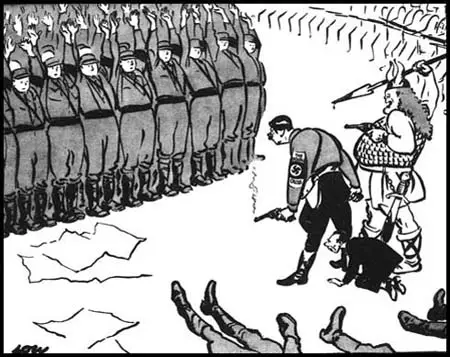
A large number of the SA officers were shot as soon as they were captured but Adolf Hitler decided to pardon Roehm because of his past services to the movement. However, after much pressure from Hermann Goering and Heinrich Himmler, Hitler agreed that Roehm should die. At first Hitler insisted that Roehm should be allowed to commit suicide but, when he refused, Ernst Roehm was killed by two SS men.
Hitler told Albert Speer what happened at Bad Wiesse: "Hitler was extremely excited and, as I believe to this day, inwardly convinced that he had come through a great danger. Again and again he described how he had forced his way into the Hotel Hanselmayer in Wiessee - not forgetting, in the telling, to make a show of his courage: We were unarmed, imagine, and didn't know whether or not those swine might have armed guards to use against us. The homosexual atmosphere had disgusted him: In one room we found two naked boys! Evidently he believed that his personal action had averted a disaster at the last minute: I alone was able to solve this problem. No one else! His entourage tried to deepen his distaste for the executed SA leaders by assiduously reporting as many details as possible about the intimate life of Roehm and his following."
The purge of the SA was kept secret until it was announced by Hitler on 13th July. It was during this speech that Hitler gave the purge its name: Night of the Long Knives (a phrase from a popular Nazi song). Hitler claimed that 61 had been executed while 13 had been shot resisting arrest and three had committed suicide. Others have argued that as many as 400 people were killed during the purge. In his speech Hitler explained why he had not relied on the courts to deal with the conspirators: "In this hour I was responsible for the fate of the German people, and thereby I become the supreme judge of the German people. I gave the order to shoot the ringleaders in this treason."
Joseph Goebbels later regretted the killing of Roehm: "I point out to the Führer at length that in 1934 we unfortunately failed to reform the Wehrmacht when we had an opportunity of doing so. What Roehm wanted was, of course, right in itself but in practice it could not be carried through by a homosexual and an anarchist. Had Roehm been an upright solid personality, in all probability some hundred generals rather than some hundred SA leaders would have been shot on 30 June. The whole course of events was profoundly tragic and today we are feeling its effects. In that year the time was ripe to revolutionise the Reichswehr. As things were the Führer was unable to seize the opportunity. It is questionable whether today we can ever make good what we missed doing at that time. I am very doubtful of it. Nevertheless the attempt must be made."
Roehm was replaced by Victor Lutze as head of the SA. Lutze was a weak man and the SA gradually lost its power in Hitler's Germany. The Schutz Staffeinel (SS) under the leadership of Heinrich Himmler grew rapidly during the next few years, replacing the SA as the dominant force in Germany.
By the time Hitler gained power he had ceased to be a practising Christian. He did not have the confidence to abolish Christianity in Germany. In 1934 Hitler signed an agreement with Pope Pius XI in which he promised not to interfere in religion if the Catholic Church agreed not to become involved in politics in Germany.
Primary Sources
(1) Adolf Hitler, speech to the NSDAP Women's Organization (September, 1934)
The slogan "emancipation of women" was invented by Jewish intellectuals. If the man's world is said to be the State, his struggle, his readiness to devote his powers to the service of the community, then it may perhaps be said that the woman's in a smaller world. For her world is her husband, her family, her children, and her home. But what would become of the greater world if there were no one to tend and care for the smaller one? The great world cannot survive if the smaller world is not stable. We do not consider it correct for the women to interfere in the world of the man. We consider it natural if these two worlds remain distinct.
(2) Frederick T. Birchall, New York Times (19th August, 1934)
Eighty-nine and nine-tenths per cent of the German voters endorsed in yesterday's plebiscite Chancellor Hitler's assumption of greater power than has ever been possessed by any other ruler in modern times. Nearly 10 per cent indicated their disapproval. The result was expected.
The German people were asked to vote whether they approved the consolidation of the offices of President and Chancellor in a single Leader-Chancellor personified by Adolf Hitler. By every appeal known to skillful politicians and with every argument to the contrary suppressed, they were asked to make their approval unanimous.
Nevertheless 10 per cent of the voters have admittedly braved possible consequences by answering "No" or made their answers, ineffective by spoiling the simplest of ballots. There was a plain short question and two circles, one labeled "Yes" and the other "No," in one of which the voter had to make a cross. Yet there were nearly 1,000,000 spoiled ballots.
The results given out by the Propaganda Ministry early this morning show that out of a total vote of 43,438,378, cast by a possible voting population of more than 45,000,000, there were 38,279,514 who answered "Yes," 4,287,808 who answered "No" and there were 871,056 defective ballots. Thus there is an affirmative vote of almost 90 per cent of the valid votes and a negative vote of nearly 10 per cent exclusive of the spoiled ballots which may or may not have been deliberately rendered defective.
The endorsement gives Chancellor Hitler, who four years ago was not even a German citizen, dictatorial powers unequaled in any other country, and probably unequaled in history since the days of Genghis Khan. He has more power than Joseph Stalin in Russia, who has a party machine to reckon with; more power than Premier Mussolini of Italy who shares his prerogative with the titular ruler; more than any American President ever dreamed of.
No other ruler has so widespread power nor so obedient and compliant subordinates. The question that interests the outside world now is what Chancellor Hitler will do with such unprecedented authority.
In the Communist districts protest votes with Communist inscriptions were rare. In Western Berlin they were more frequent. In one district five ballots had the name "Thaelmann" written in. (Ernst Thaelmann is an imprisoned Communist leader.) One ballot contained this inscription, "Since nothing has happened to me so far I vote 'Yes.'" It was signed "Non-Aryan."
Interesting also are the following results: the hospital of the Jewish community in one district cast 168 "Yes" votes, 92 "Noes," and 46 ballots were invalid. The Jewish Home for Aged People in another district cast 94 "Yes" votes, four "Noes" and three invalid ballots. This vote is explainable, of course, by the fear of reprisals if the results from these Jewish institutions had been otherwise. It is paralleled by other results outside Berlin.
In all Bavaria Chancellor Hitler received the largest vote in his favor in the concentration camp at Dachau where 1,554 persons voted "Yes" and only eight "No" and there were only ten spoiled ballots.
Hamburg, which only two days ago gave Herr Hitler the most enthusiastic reception he had ever received anywhere, led the country in the opposition vote. The official figures were: Total vote cast, 840,000; "Yes," 651,000; "No," 168,000; invalidated ballots, 21,000.
The "No" vote, in other words was 20 per cent of the total vote. Counting the invalid ballots as negative in intent, the total opposition votes exceeded 22 per cent. The percentage of the electorate voting was 92.4.
Hamburg is the home city of Ernst Thaelmann and on his triumphant entry into the city on Friday, Herr Hitler made it a point to drive past Thaelmann's former home.
As far as observers could ascertain, the election everywhere was conducted with perfect propriety, and secrecy of the ballot was safe-guarded. The ballots were marked in regular election booths and placed in envelopes and these were put in the ballot boxes. After the voting had ended the ballot box was emptied on a large table and the vote was counted publicly in the regular manner. Appraising of individual votes seemed impossible.
One check on possible non-voters, however, was exercised by instructions that the voting authorizations issued to those who for one reason or another planned to be outside their regular voting district on election day must be returned unless used. The number of such authorizations issued for this election exceeded anything known before.
Throughout the day Storm Troopers stood before each polling place with banners calling on the voters to vote "Yes." Otherwise voters remained unmolested. Inside the polling places uniforms and even party emblems had been forbidden, but the execution of this order was lax. In some apparently doubtful districts brown uniforms dominated the scene as a warning to would-be opponents.
(3) Comments made by Ernst Roehm to Kurt Ludecke (January, 1934)
Hitler can't walk over me as he might have done a year ago; I've seen to that. Don't forget that I have three million men, with every key position in the hands of my own people, Hitler knows that I have friends in the Reichswehr, you know! If Hitler is reasonable I shall settle the matter quietly; if he isn't I must be prepared to use force - not for my sake but for the sake of our revolution.
(4) Ernst Roehm, announcement to the Sturm Abteilung (SA) (May, 1934)
1934 will require all the energies of every SA fighter. I recommend, therefore, to all SA leaders to begin organizing leave already in June. Therefore, for a limited number of SA leaders and men, June, and for the majority of the SA, July, will be a period of complete relaxation in which they can recover their strength. I expect the SA to return on 1st August completely rested and refreshed in order to serve in those honourable capacities which nation and fatherland rested and refreshed in order to serve in those honourable capacities which nation and fatherland expect of it.
(5) Erich Kempka, was Hitler's chauffeur on 29th June, 1934. In 1946 he gave an interview where he described what happened when Hitler arrived at the Hotel Hanselmayer that night.
Hitler entered the room where Edmund Heines was staying. I heard him shout: "Heines, if you are not dressed in five minutes I'll have you shot on the spot!" I withdrew a few steps and a police officer whispers to me that Heines had been in bed with an 18 year old Obertruppfuher.
Hitler entered Roehm's bedroom alone with a whip in his hand. Behind him were two detectives with pistols at the ready. He spat out the words; "Roehm, you are under arrest."
Roehm's doctor comes out of a room and to our surprise he has his wife with him. I hear Lutze putting in a good word for him with Hitler. Then Hitler walks up to him, greets him, shakes hand with his wife and asks them to leave the hotel, it isn't a pleasant place for them to stay in, that day.
Now the bus arrives. Quickly, the SA leaders are collected from the laundry room and walk past Roehm under police guard. Roehm looks up from his coffee sadly and waves to them in a melancholy way. At last Roehm too is led from the hotel. He walks past Hitler with his head bowed, completely apathetic.
(5) Albert Speer met Adolf Hitler the day after the Night of the Long Knives. He wrote about the meeting in his book, Inside the Third Reich (1970)
Hitler was extremely excited and, as I believe to this day, inwardly convinced that he had come through a great danger. Again and again he described how he had forced his way into the Hotel Hanselmayer in Wiessee - not forgetting, in the telling, to make a show of his courage: "We were unarmed, imagine, and didn't know whether or not those swine might have armed guards to use against us." The homosexual atmosphere had disgusted him: "In one room we found two naked boys!" Evidently he believed that his personal action had averted a disaster at the last minute: "I alone was able to solve this problem. No one else!"
His entourage tried to deepen his distaste for the executed SA leaders by assiduously reporting as many details as possible about the intimate life of Roehm and his following. Bruckner showed Hitler the menus of banquets held by the Roehm clique, which had purportedly been found in the Berlin SA headquarters. The menus listed a fantastic variety of courses, including foreign delicacies such as frogs' legs, birds' tongues, shark fins, seagulls' eggs, along with vintage French wines and the best champagnes. Hitler commented sarcastically: "So, here we have those revolutionaries! And our revolution was too tame for them."
(6) Adolf Hitler, speech (September, 1935)
The so-called granting of equal rights to women, which Marxism demands, in reality does not grant equal rights but constitutes a deprivation of rights, since it draws the woman into an area in which she will necessarily be inferior. The woman has her own battlefield. With every child that she brings into the world, she fights her battle for the nation.
Student Activities
Adolf Hitler's Early Life (Answer Commentary)
British Newspapers and Adolf Hitler (Answer Commentary)
An Assessment of the Nazi-Soviet Pact (Answer Commentary)
Lord Rothermere, Daily Mail and Adolf Hitler (Answer Commentary)
Heinrich Himmler and the SS (Answer Commentary)
Adolf Hitler's Early Life (Answer Commentary)
Adolf Hitler v John Heartfield (Answer Commentary)
The Hitler Youth (Answer Commentary)
German League of Girls (Answer Commentary)
Night of the Long Knives (Answer Commentary)
The Political Development of Sophie Scholl (Answer Commentary)
The White Rose Anti-Nazi Group (Answer Commentary)
Kristallnacht (Answer Commentary)
Trade Unions in Nazi Germany (Answer Commentary)
Hitler's Volkswagen (The People's Car) (Answer Commentary)
Women in Nazi Germany (Answer Commentary)
The Assassination of Reinhard Heydrich (Answer Commentary)
The Last Days of Adolf Hitler (Answer Commentary)
